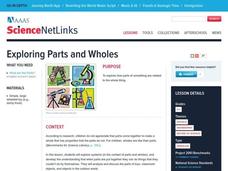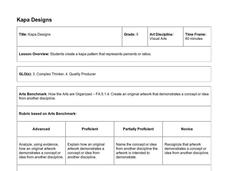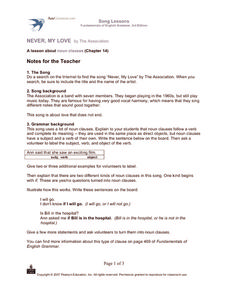Curated OER
Haniwa
Students use non-fired clay and posterboards to create and display examples of Haniwa and kofun in this exciting lesson for the Social Studies, Humanities, Asian Studies, or Art classroom.
Curated OER
Forces Cause Change
Third graders will gain recognition that physical relationships affect each other and that change occurs when one object acts upon another.The teacher will recognize ways in which technology can be used to enhance the understanding of...
Polytechnic Institute of NYU
Potential vs. Kinetic Energy
Legos in science class? Watch your pupils fall in love with this activity. After learning to measure potential and kinetic energy, young scientists create their own ramps using Lego Mindstorm sensors and software.
Curated OER
The Weight of Water
Young scholars examine how salt water is more dense than fresh water through experimentation with eggs.
Curated OER
Exploring Parts and Wholes
Students explore the concept of parts making up a whole. In this parts and whole instructional activity, students come to understand that parts of a system must come together in order for the system to work properly. Students investigate...
Curated OER
U.S. History: de Soto's Alternate Route
Eighth graders examine various maps associated with Hernando de Soto's expedition. By comparing their textbook maps with newer maps, they answer a battery of focus questions. Using Microsoft Word, 8th graders answer the questions...
Curated OER
Volume of Spheres
Students find the volume of spheres. In this geometry lesson, students measure and derive the formula for each shape and solid. They use the correct terminology and units when solving these problems.
Discovery Education
Sonar & Echolocation
A well-designed, comprehensive, and attractive slide show supports direct instruction on how sonar and echolocation work. Contained within the slides are links to interactive websites and instructions for using apps on a mobile device to...
Curated OER
Mandala Portfolio Project
Here's a great idea for writing portfolios. Kids decorate all four sides of their portfolio, introducing themselves, their families, goals, dreams, and favorite things. Detailed directions for all four panels and a rubric are included in...
Curated OER
You're Wearing Your Plants!
Students examine the many uses of plants and trees by looking at their clothing. They make lists of products that come from plants and trees and their uses.
K12 Reader
Noun Clauses: Acting as a Noun
Noun clauses and how they function in sentences is the focus of this exercise, the final resource in a series of 36 grammar worksheets.
Curated OER
Prepositional Phrases
What is a preposition? You can't possibly understand prepositional phrases without first learning prepositions. Start by reading the informative paragraph at the top of the page. An example is also included. This is a great introduction...
LABScI
Catapult: Flight of the Marshmallows
Watch your marshmallows fly. The engaging STEM activity has groups create a catapult to launch marshmallows. After testing their prototypes, they consider improvements and redesign their catapults.
Arizona State University
Tricorn Triangles
Help your learners examine triangles. Pupils explore the different sizes and measurements of triangles. They discover triangles can be isosceles or scalene, and examine the attributes of triangles. Here is the website where you can find...
Virginia Department of Education
Weather Patterns and Seasonal Changes
Get your class outside to observe their surroundings with a lesson plan highlighting weather patterns and seasonal changes. First, learners take a weather walk to survey how the weather affects animals, people, plants, and trees during...
Curated OER
Light, Colors, and Vision
Third graders experience optic illusions by creating flipbooks. In this optics lesson plan, 3rd graders view a demonstration of the workings of rods and cones using a camera. They are shown an optical illusion and work to create their...
San José State University
Possessive Apostrophes
A great review of possesive nouns and how to add apostrophes. Clearly demonstrating where to place the apostrophe for different nouns, the resource also notes some tricky exceptions. Reinforce the concept with a little practice putting...
Illustrative Mathematics
Measure Me!
How many unifix cubes tall are you? If you're not sure, then perform this math activity with your class and find out. Working in pairs, young mathematicians make measuring sticks out of unifix cubes in order to determine the length of...
Hawaiʻi State Department of Education
Kapa Designs
I always knew there was a connection between art and math, and this activity proves it. Fifth graders will use what they know about ratios and percents to design art inspired by Polynesian kapa cloth. A grid, specific guidelines, and the...
Curated OER
Prepositions Can Show Positions in Space
Answer the questions where and when with this handy prepositions activity. Twelve questions contain prepositional phrases for your class to find and label; the first one is completed as an example. The resource includes an answer key on...
K12 Reader
Major Art Periods
After examining a brief article about the major art periods, readers use the provided graphic organizer to identify the main idea and supporting ideas in the paragraph.
Azar Grammar
Song Lessons: Never, My Love
Here's a clever way to introduce language learners to noun clauses. After a brief exercise that provides examples of different types of noun clauses, class members listen to the Association's "Never, My Love" and identify the clauses in...
Curated OER
Fun With Sorting and Classifying
Using a variety of activities, kindergartners explore sorting and classification. Learners engage in an online sorting activity, read books involving classification, and create their own class book. This is a marvelousway to explore this...
Savvas Learning
Let's Get Moving
Scholars examine, cut, paste, and sort 12 images featuring different types of movement in order to show what they know about energy—potential and kinetic.

























